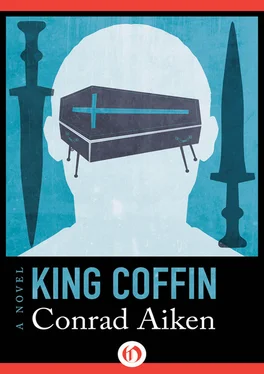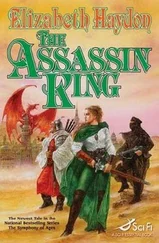He closed the door, dialed with his pipestem, listened to the far-off ringing, heard the click of the lifted receiver, and the slow Jewish drawl, a woman’s voice.
— Who iss it?
— Is Mr. Kazis there?
— No, Mr. Kazis has gone to work now, who iss it please?
— Can you tell me where I can get him, it’s most important.
— Well, of course, you could try the paint shop on Stuart Street, but they don’t like for—
— Can you give me the name—?
— Why, it’s the Vacuum Paint Shop and Upholstery—
He hung up the receiver, laughed, dropped in another nickel, waited.
— Hello?
— Ammen speaking.
— Why, Jasper—
— I’ve just had a vision. Dislocation number seven, or is it eight! And listen—
— Yes?
— Here’s a funny name just to remember, and then forget: Joseph Kazis. Came over in the Mayflower .
— What? Hello, Jasper—?
— But we shall see! No, it will not be Kazis. It will be someone else.… Someone strange!..
To say that he was unmistakable, when he came a few minutes later, was not quite the truth: it happened, when it happened, very quickly, very lightly, there was really nothing in the little man’s appearance which particularly answered to any previous notion. In that respect, it might even be said that it was not the man; the face was certainly not the face which he had vaguely foreseen. No, the decision was made automatically, somatically, with a mere physical gesture: he had simply, and before he knew it, stepped away from the telephone booth, against which he was leaning, and begun to follow him. This was no Joseph Kazis, no abstraction, nothing so remote as a mere name in South Boston, and in that sense it was already possible to feel an acute disappointment, a definite derangement of the basic idea. But of course, the minute he thought about that, he saw that it was inevitable; and what the little man supplied was exactly what mathematically would have had to be supplied — a real and surprising existence . He was actual.
He had come up the sloping ramp of concrete from the Arlington side, walking rather slowly, with his head a little down; he seemed to be hesitating; and when he had arrived almost as far as the telephone booths, having passed the barrier, he stopped for a moment and stood still. He looked straight before him with a half-smiling fixity, his hands were in his overcoat pockets, his overcoat was unbuttoned and hung loose at the sides with an effect of habitual carelessness, the gray tweed hat was rather far back on his head. He was obviously wondering whether to turn around or not. Something had been forgotten; or some plan had been, or was about to be, altered. That much was clear, it was amusing to watch the whole affair transacted so shamelessly in the open, as on a trans-lux screen, but it was also plain enough, from the continuous little smile, a slightly stupid smile, that whatever the thing was it wasn’t of very great importance. The moment of irresolution passed, he gave a little cough and turned briskly toward the platform. He walked with an odd jauntiness, his feet turned out, and his head on one side. There was something birdlike about him, and the shape of his coat, which was too long for him, and had a heavy collar of cheap fur, somehow accentuated this. Lowering one shoulder, he turned neatly into the door of the train.
Pausing just inside the door, he looked quickly left and right, evidently saw that the forward end was the less crowded of the two, began to edge his way through the double row of passengers: to watch him from outside, and the slight patronizing smile with which he ingratiated while he made his way, was also to be able, without appearing to follow or any risk of attracting attention, to join him by entering at the front of the car. Accordingly, Ammen walked parallel with his victim: saw the gray hat appear and disappear: saw the hand go up once to touch a handhold and drop again: once glimpsed the half-turned smiling face, noticed for the first time the little mustache. Entering, he found himself almost too close to the little man, who had found a seat and sat down. But by standing opposite, with his back turned, it was easy to pivot slightly in order to watch him. It was also possible, by stooping, to see his reflection in the dark luster of the window glass. He could not leave without being seen — that much was at any rate certain. And that was all of course that was necessary. The danger always arose there: it had happened several times. In the case of a hurried exit at a more or less crowded station, it was necessary to be close at hand.
Revolving a little now, with his two hands above him on the white enameled handhold, he discovered that he could look obliquely between two swaying shoulders, and over a lifted newspaper, directly at the man’s face. This was perfectly safe, for the blue eyes behind their frameless spectacles were turned studiously downward: with complete absorption, the little man was making notes with a red pencil in a red notebook. The first impression of smallness and neatness was at once corroborated. The face was not young, it was obviously somewhat worn, showed unmistakable lines of care and age — he was perhaps thirty-five — there were sallow hollows under the eyes, which on calmer inspection looked tired, but in contrast to all this was a quite definite boyishness and delicacy in the small neatness of the head, the features, the short-clipped mustache. It was a boy grown old; a boy hardened prematurely, by whatever chemistry, into a man. The maturity, or the appearance of it, might be artificial or forced, but it was unmistakable, just the same: the calm laconic assurance which had been evident in his gait was again evident in the clear and detached precision, the obvious efficiency , with which he was giving his whole attention to the making of notes in a notebook. There was conceit in it too. He thought well of himself, he was pleased with his ability to abstract himself from his surroundings, just as he had been pleased with the sharp little foresight with which he had found himself an empty seat in a crowded train. The entire impression was that of a child-actor’s trained, and somewhat callous, small competence. When he looked up, presently, closing and pocketing the notebook and pencil, and glanced idly and again half-smilingly right and left, but not upward towards the face that watched him, his self-satisfaction was immense. He knew what he was doing, and that what he was doing was important.
Important?
But the importance was perhaps false.
The importance was simply a shell, the carefully elaborated defense of a weakling: it had no reality. The frog and the ox, as in Aesop’s fable! Nothing could be clearer than that the little man’s life was bound in shallows, if not in miseries, at any rate in smallnesses, and that the bright little notebook, the sharp little pencil, the detached little air of foresight and wisdom, all that careful assumption of precision and weight, were nothing at all but the feeble compensations of a barren and limited experience, a small body, a restricted mind. Already it was possible to begin the process of surrounding him: and exactly as it was easy to look down at him in the hurrying train, to study his mouth, his eyes, his hands, the large mole at the outer corner of the right eyebrow, the brown feather in the hatband of the cheap tweed hat, so also it was becoming absurdly simple to see the background, the suburban shabbiness and pretentious meanness, of his life. That life began already to lie open: with a single powerful glance one found its essential tissue: two suits of clothes, two pairs of shoes, dull lithochromes on the walls, a dirty tooth brush and a clean one, the cracked mirror over the kitchen sink, a comb always carried in the breast pocket of the coat, an umbrella stand in the front hall, in the zinc base of which was an old pair of rubbers. Or perhaps two, perhaps he was married. Perhaps even — and Ammen smiled at the advertisement at which he found himself staring, Morning Mouth Never Bothersome — he had children.
Читать дальше












